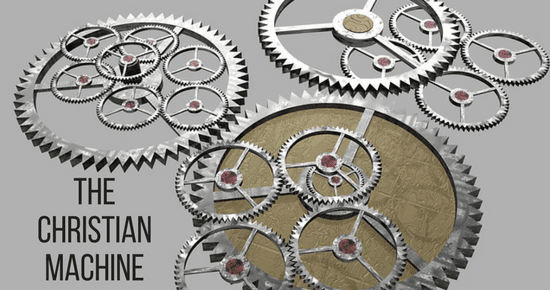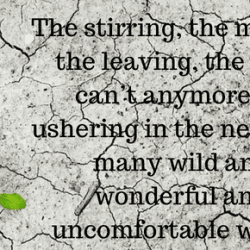
I had another post in mind for today to start a short series about the major movements of a shifting faith, but I’ll post next week instead. After hearing Eugene Peterson’s retraction about same-sex marriage upon receiving hard and heavy pushback from the Christian publishing industry, I wanted to say this while it was fresh:
The Christian machine is alive and well and has tried to gobble many of us up.
The Christian machine has catalyzed many of us into a faith unraveling that has left us on the margins of all we once knew.
The Christian machine is powerful; yes, times are changing, and I’m glad for Christianity’s shake-up and what’s emerging, but it’s going to be a rough ride.
The Christian machine does everything in the name of Jesus, but for many of us it feels completely contrary to almost everything we believe about Jesus.
What is the Christian machine?
I’d define it as:
The central block of power and resources that Christian publishing, conferences, church leadership, and ministry systems own, run, and protect.
Here are a few things about the Christian machine that I’ve observed over many years of ministry, especially on the margins.
The Christian machine demands allegiance to doctrine, beliefs, and a certain way of being. In other words, those who play by the rules, say the right things, believe the right things, hold to the right things are “in” and those who don’t find themselves “out.”
The Christian machine loves the pretty and the popular. It’s not fond of messy, unpredictable, awkward, and weird. “Those people” are service projects, ministry models, people to “save” but never the ones who hold the power.
The Christian machine controls the microphone. Who gets to say what and how is central. This is why there are usually certain kinds of speakers at conferences, pastors who get to preach, and books that get distributed.
The Christian machine loves conformity. The bounds have probably expanded a little over the years and there’s a more room for rabble-rousing when it comes to Jesus, but watch out for being pinned down for specific views on LGBQT+ equality or biblical-almost-anything, abortion or politics. The potential consequence for being clearly off their track is definitely losing a job, a leadership position, a book deal, a spot at the table.
The Christian machine is usually not an equal, healthy, open system. Typically (but not always), it’s dominated by white male leadership, homogeneity of belief, socioeconomics, and relationships with other people with similar power. Those who don’t fit this template—women, people of color, advocates, activists, dissenting voices, crazy-about-the-margins–usually aren’t part in a significant way. It doesn’t mean their voices aren’t listened to or they aren’t on teams; but on the whole they don’t really hold the power.
The Christian machine decides who is in and who is out. Who gets to play and who doesn’t. Who’s above and who’s under. Who’s worthy and who’s not. Who’s biblically sound according to their interpretation and who’s not. Who’s a peace-keeper of the status quo (highest valued) and who’s a trouble-maker (watch out for them).
The Christian machine decides what is okay to believe. This is why so many faith unravelers have had to leave systems they once gave their hearts, lives, and families to. We just can’t align anymore with the core beliefs, not only about theology but also about philosophy of ministry, “church” and social justice.
I have no idea of the ins and outs of Eugene Peterson’s journey and how he could be so clear in an interview one day about same-sex marriage and change it two days later. I respect his work and am grateful for his voice in the kingdom of God.
However, watching it yesterday was a great reminder of the reality of the Christian machine and the power it yields.
So many of us who are now spiritual refugees, church burnouts and freedom seekers have almost been gobbled completely up by the Christian machine.
We served in churches where we weren’t pretty enough, quiet enough, strong enough, charismatic enough, spiritual enough, meek enough, cool enough, submissive enough.
We spoke our truth about justice and equality and our Jesus-infused dreams and were met with unhealthy power, control, and scapegoating.
We tried and tried and tried and tried to break in to leadership structures and teams and ways of leading and serving in particular ministries and churches and were never valued or heard.
We rocked the boat and found ourselves tossed overboard without a blink.
We challenged the unhealthy ways of certain systems and were labeled divisive, heretics, or in rebellion and told to pray and submit.
We had our books pulled from the #1 Christian retailer because we were female pastors, supporters of LGBQT+ equality, or questioners of particular biblical interpretation.
We felt the Holy Spirit prompting us that “something wasn’t quite right” with church as we knew it and once we spoke up or questioned or challenged or advocated for something different, we were ostracized, scripturized, and marginalized.
The Christian machine is strong, people.
But I do believe that the rumblings of Christianity’s current radical faith shift is stronger in the end.
So many men and women I know of all shapes, sizes, ages, and experiences have the deep sense of the Christian machine being so far away from the subversive ways of Jesus they cannot shake it.
We realize the empire we are up against aren’t only the worldly empires but the religious ones.
We have come to a place where we recognize we truly don’t want anything to do with the Christian machine and feel empathy (and sometimes irritation) for those still being ground down by its wheels.
We are healing from the Christian machine’s teeth and beginning to find new life.
Mostly, we are grateful we no longer have to play that way.












